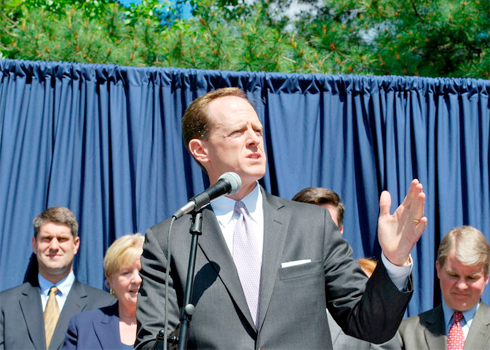New Republican legislation in the House and Senate would force the U.S. government to reroute huge amounts of money to China and other creditors in the event that Congress fails to raise its debt ceiling.
“I intend to introduce legislation that would require the Treasury to make interest payments on our debt its first priority in the event that the debt ceiling is not raised,” Sen. Pat Toomey (R-PA) wrote in a Friday Wall Street Journal op-ed.
If passed, Toomey’s plan would require the government to cut large checks to foreign countries, and major financial institutions, before paying off its obligations to Social Security beneficiaries and other citizens owed money by the Treasury — that is, if the U.S. hits its debt ceiling. Republican leaders insist they will raise the country’s debt limit before this happens. But first, they’re going to try to force Democrats to accept large spending cuts, using their control over the debt limit as leverage. That means gridlock, and the threat that they’ll come up short.
That’s where Toomey’s idea supposedly comes in. And yet, according to the Treasury Department, his plan wouldn’t actually avoid a default, or its catastrophic consequences.
“[T]his idea is unworkable,” said Deputy Treasury Secretary Neal Wolin in a statement. “It would not actually prevent default, since it would seek to protect only principal and interest payments, and not other legal obligations of the U.S., from non-payment. Adopting a policy that payments to investors should take precedence over other U.S. legal obligations would merely be default by another name, since the world would recognize it as a failure by the U.S. to stand behind its commitments.”
The full impact of an actual default is unclear, but Treasury, and independent experts have warned that it would among other consequences, cause an enormous loss of wealth among U.S. citizens. Under the circumstances, one would think that the government’s top priority would be ensuring that citizens owed money by the Treasury would take precedence over, say, foreign governments. But that wouldn’t be the case if Toomey and some House Republicans, including Republican Study Committee Chairman Jim Jordan (R-OH), get their way.
The Administration thinks such a policy would be tone deaf. “Such a policy would also be unacceptable to American servicemen and women, retirees, and all other Americans, who would rightly reject the notion that their payment has been deemed a lower priority by their government,” Wolin added.
The top Democrats on the House and Senate Budget Committees call it a jaw-droppingly bad idea.
“I think it is a dreadful idea,” Sen. Kent Conrad (D-ND) told National Journal. “Basically what they are saying is, pay China first. Are we going to forget about the American public and the things that they need? Somehow they are secondary? And paying the Chinese and the Japanese is the first priority of this country? I don’t even know how to describe that idea; it’s just a very, very bad one.”
His House Democratic counterpart, Rep. Chris Van Hollen (D-MD), added “What they are saying essentially is that the full faith and credit of the American government extends to a lot of foreign countries, but it doesn’t extend to the American people themselves.”
Officials don’t expect the U.S. to reach its debt limit until Spring. That gives John Boehner and Mitch McConnell (and, perhaps, Harry Reid) several weeks to figure out how to raise it. But Republicans on the Hill remain divided over if and how to get that done. And, it seems, about how to move forward if they fail.






